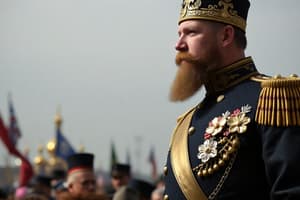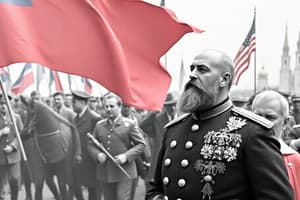Podcast
Questions and Answers
What was the immediate trigger for the Russian Revolution?
What was the immediate trigger for the Russian Revolution?
- Civilian opposition to autocracy
- Rising support for the monarchy
- Formation of a coalition government
- Urban worker strikes (correct)
Which group of politicians hoped to reform Tsarist institutions peacefully?
Which group of politicians hoped to reform Tsarist institutions peacefully?
- Marxist revolutionaries
- Coalition government (correct)
- Bolsheviks
- Leftist movements
How did Nicholas II respond to the opposition to his rule?
How did Nicholas II respond to the opposition to his rule?
- He tried to regain power and save his country (correct)
- He embraced the revolutionary sentiment
- He took decisive action against leftist movements
- He peacefully abdicated the throne
What fundamental change occurred with the Bolsheviks seizing control in October 1917?
What fundamental change occurred with the Bolsheviks seizing control in October 1917?
How did Nicholas II's rule impact the fall of the Tsardom?
How did Nicholas II's rule impact the fall of the Tsardom?
What significant consequence followed from the fall of the Tsardom?
What significant consequence followed from the fall of the Tsardom?
What title did Nikolai Alexandrovich Romanov hold as the last emperor of Imperial Russia?
What title did Nikolai Alexandrovich Romanov hold as the last emperor of Imperial Russia?
Where was Tsar Nicholas II educated before ascending the throne?
Where was Tsar Nicholas II educated before ascending the throne?
Which war did Nicholas II face during his rule that intensified social unrest in Russia?
Which war did Nicholas II face during his rule that intensified social unrest in Russia?
What was a major criticism of Tsar Nicholas II's leadership during his reign?
What was a major criticism of Tsar Nicholas II's leadership during his reign?
Why did Nicholas II's weak leadership qualities undermine his rule?
Why did Nicholas II's weak leadership qualities undermine his rule?
How did the Russo-Japanese War impact Tsar Nicholas II's rule?
How did the Russo-Japanese War impact Tsar Nicholas II's rule?
Flashcards are hidden until you start studying
Study Notes
The Fall of the Romanov Dynasty: Troubles with Tsar Nicholas II and the Russian Revolution
In the early twentieth century, Russia's history took a dramatic turn when its centuries-old monarchy crumbled under unprecedented political upheaval. At the heart of this epic transformation were two interconnected forces — the reign of Tsar Nicholas II and the eruption of the Russian Revolution.
Tsar Nicholas II
Born into royalty, Nikolai Alexandrovich Romanov became the last emperor of Imperial Russia after his father Alexander III passed away suddenly in 1894. Nicknamed 'Nicky' by English relatives, he was educated in Germany and Britain before ascending the throne in 1894. As tsar, Nicholas inherited vast territories spanning multiple continents including European Russia, Central Asia, and parts of North America through Siberia. His rule was marked by deep social divides between aristocratic elites and the working classes, struggles over industrialization, and ongoing imperial conflicts like the Russo-Japanese War.
Despite being well-intentioned and deeply religious, Nicholas faced numerous challenges while trying to govern his sprawling empire. He lacked charisma, failed to adapt to changing times, and demonstrated weak leadership qualities. These shortcomings severely undermined the legitimacy of his rule during periods of profound crisis, notably during World War I.
The Russian Revolution
The disastrous course of World War I was kindled by Nicholas' mismanagement and poor command decisions. In response, civilian opposition to autocracy exploded, fueling a tumultuous series of events known collectively as the Russian Revolution. Initially, revolution spread from below, engulfing urban workers who staged strikes. A coalition government led by moderate liberal politicians formed, hoping to reform Tsarist institutions peacefully. However, their efforts proved insufficient against rising revolutionary sentiment.
As leftist movements grew bolder, support for the monarchy dwindled regardless of genuine affection for the family among many Russians. By October 1917, a Marxist movement known as Bolsheviks led by Vladimir Lenin seized control, deposing Nicholas and ending nearly three centuries of Romanov rule in Russia. Despite attempts to regain power and save his country, Nicholas was forced into exile where he and his immediate family were ultimately executed by firing squad in 1918.
With the fall of the Tsardom came profound changes for Russia. The subsequent era witnessed a transition to communism, intensified conflict, and even more significant shifts in global politics. Yet it all began with a single dynasty, cemented within its own sunset by the combined weight of a weakened ruler and restless masses seeking radical change.
Studying That Suits You
Use AI to generate personalized quizzes and flashcards to suit your learning preferences.





